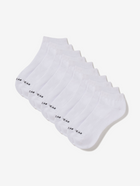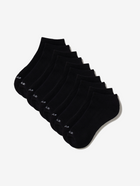In a world where fashion choices have far-reaching implications, Allwear has taken a bold stance by curating a collection that seamlessly blends style and sustainability.
Join us on a journey that explores the essence of eco-conscious fashion, showcases our meticulously crafted products, and unveils the benefits of embracing a wardrobe that aligns with the values of inclusivity, environmental responsibility, and uncompromising style.
The Environmental Impact of Fashion
The fashion industry, known for its constant evolution and trends, plays a significant role in shaping our world. However, behind the glamour and allure of new collections lies an alarming environmental toll that often goes unnoticed. In this section, we will uncover the key environmental challenges posed by the fashion industry and how our choice of fabrics can make a difference.
Fashion's Environmental Challenges
The fashion industry is one of the largest contributors to environmental degradation. It's essential to recognize the scale of the problem to understand why sustainable choices, like opting for natural fabrics, are vital:
Carbon Emissions
Fashion production is energy-intensive, relying heavily on fossil fuels. From manufacturing textiles to transporting finished garments, every step in the supply chain contributes to greenhouse gas emissions. The result is a substantial carbon footprint that affects climate change.
Water Consumption
Water is a precious resource, and the fashion industry is a notorious consumer. Fabric dyeing and finishing processes, often involving water-intensive techniques, can lead to water pollution and scarcity. Cotton, one of the most commonly used fabrics, is particularly water-thirsty, exacerbating the issue.
Chemical Pollution
Chemicals used in dyeing and finishing textiles can pollute waterways and harm ecosystems. These chemicals not only contaminate natural water sources but also affect the health of those living in proximity to manufacturing facilities.
The Role of Fabric Choice
Fabric choice is a critical factor in addressing these environmental concerns. The type of fabric used in clothing production significantly impacts the overall ecological footprint. Next, we'll delve into the resurgence of natural fabrics and their potential to mitigate these issues.
The Rise of Natural Fabrics
In recent years, a remarkable shift has occurred in the fashion industry – a return to nature. Increasingly, fashion enthusiasts and conscious consumers are embracing natural fabrics for their clothing. This shift is driven by a growing awareness of the environmental and ethical concerns associated with synthetic materials.
The Allure of Natural Fabrics
Natural fabrics like cotton, linen, hemp, silk, and wool are making a comeback in the fashion scene. Their resurgence can be attributed to several key factors:
- Comfort and Breathability: Natural fabrics are renowned for their comfort, breathability, and moisture-wicking properties. They allow the skin to breathe and regulate temperature, making them ideal choices for various seasons.
- Sustainability: In a world increasingly concerned about sustainability, natural fabrics shine. They are derived from renewable resources and often require less energy to produce compared to their synthetic counterparts.
- Biodegradability: Unlike synthetic fabrics, which can linger in landfills for centuries, natural fabrics decompose naturally, leaving a significantly smaller ecological footprint.
Embracing Ethical and Eco-friendly Fashion
The resurgence of natural fabrics aligns with a broader movement towards ethical and eco-friendly fashion choices. Consumers are now more informed and conscientious about the environmental and social impact of their clothing.
- Responsible Sourcing: Fashion brands are increasingly adopting responsible sourcing practices, ensuring that the materials used in their clothing are cultivated or harvested using eco-friendly and ethical methods.
- Supporting Local Communities: Many natural fabrics are produced by local communities worldwide, providing economic opportunities and preserving traditional craftsmanship.
- Reducing Harmful Chemicals: The shift towards natural fabrics reduces the reliance on chemicals typically associated with synthetic fabric production. This benefits both the environment and the health of those working in the industry.
The fashion industry's transformation towards natural fabrics marks an essential step towards a more sustainable and ethical future. As we explore the benefits of these textiles and their positive impact on the planet, it becomes evident that they are more than just a trend – they are a vital part of a greener and more responsible fashion landscape.
Advantages of Natural Fabrics
The resurgence of natural fabrics in the fashion industry is not merely a passing trend; it's driven by a range of compelling advantages that resonate with both consumers and brands. Let's delve into the key benefits of choosing natural fabrics for your wardrobe:
Comfort and Breathability
Natural Comfort: Natural fabrics such as cotton, linen, and bamboo offer exceptional comfort. They are soft against the skin and allow for better air circulation, making them ideal for hot and humid weather.
Moisture Management: These fabrics have excellent moisture-wicking properties, which means they can absorb sweat and keep you feeling fresh and dry, making them perfect for activewear and undergarments.
Sustainability and Eco-friendliness
Renewable Resources: Natural fabrics are derived from renewable resources like plants (cotton, bamboo, hemp) or animals (wool, silk). This reduces the strain on the environment and minimizes resource depletion.
Reduced Carbon Footprint: The production of natural fabrics typically involves fewer energy-intensive processes compared to synthetic materials. This results in a reduced carbon footprint and a smaller impact on global warming.
Biodegradability: One of the most significant environmental advantages of natural fabrics is their biodegradability. Unlike synthetic materials that persist in landfills for centuries, natural fabrics break down naturally over time, contributing to a circular economy.
Hypoallergenic Properties
Natural fabrics are often hypoallergenic and less likely to cause skin irritations or allergic reactions compared to synthetic textiles. This makes them a preferred choice for those with sensitive skin or allergies.
Timeless Aesthetics
Natural fabrics are synonymous with classic and timeless aesthetics. Their elegant textures and neutral colors make them suitable for a wide range of styles, ensuring your wardrobe remains relevant season after season.
Versatility and Durability
Versatile Wardrobe: Natural fabrics provide versatility. Pieces made from these materials can be dressed up or down, allowing you to create various looks with a few key items.
Durability: Many natural fabrics are known for their durability. They can withstand regular wear and washing, extending the lifespan of your clothing and reducing the need for frequent replacements.
Allwear's Sustainable Fashion Collection
At Allwear, we have made it our mission to lead the way in eco-conscious fashion. We're committed to providing you with sustainable clothing options that not only elevate your style but also align with responsible and ethical practices. Here's a closer look at our sustainable fashion collection:
At the heart of Allwear is a deep commitment to eco-conscious fashion. We believe that fashion should be a force for good, and our collection reflects this ethos.
Our sustainable fashion collection is a testament to our dedication to the environment. We carefully curate products using eco-friendly materials that prioritize both style and sustainability.
By choosing Allwear's sustainable fashion collection, you're making a conscious choice for a greener and more stylish future. Our clothing not only enhances your wardrobe but also contributes to a more eco-friendly and inclusive fashion industry.
Final Thoughts on Choosing Natural Fabrics for a Greener Wardrobe
It's clear that eco-conscious fashion is no longer a niche but a necessity. Allwear's commitment to sustainability, versatile, eco-friendly products, and inclusive sizing demonstrate that fashion can be a force for positive change.
By choosing Allwear, you not only elevate your style but also contribute to a greener, more inclusive, and stylish future for fashion.



